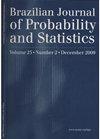Confidence intervals of the index $C_{pk}$ for normally distributed quality characteristics using classical and Bayesian methods of estimation
IF 0.5
4区 数学
Q4 STATISTICS & PROBABILITY
引用次数: 15
Abstract
One of the indicators for evaluating the capability of a process potential and performance in an effective way is the process capability index (PCI). It is of great significance to quality control engineers as it quantifies the relation between the actual performance of the process and the pre-set specifications of the product. Most of the traditional PCIs performed well when process follows the normal behaviour. In this article, we consider a process capability index, $C_{pk}$, suggested by Kane (Journal of Quality Technology 18 (1986) 41–52) which can be used for normal random variables. The objective of this article is three fold: First, we address different methods of estimation of the process capability index $C_{pk}$ from frequentist approaches for the normal distribution. We briefly describe different frequentist approaches, namely, maximum likelihood estimators, least squares and weighted least squares estimators, maximum product of spacings estimators, Cramer–von-Mises estimators, Anderson–Darling estimators and Right-Tail Anderson–Darling estimators and compare them in terms of their mean squared errors using extensive numerical simulations. Second, we compare three parametric bootstrap confidence intervals (BCIs) namely, standard bootstrap, percentile bootstrap and bias-corrected percentile bootstrap. Third, we consider Bayesian estimation under squared error loss function using normal prior for location parameter and inverse gamma for scale parameter for the considered model. Monte Carlo simulation study has been carried out to compare the performances of the classical BCIs and highest posterior density (HPD) credible intervals of $C_{pk}$ in terms of average widths and coverage probabilities. Finally, two real data sets have been analyzed for illustrative purposes.正态分布质量特征指数$C_{pk}$的置信区间的经典和贝叶斯估计方法
以有效的方式评估过程潜力和性能的能力的指标之一是过程能力指数(PCI)。它对质量控制工程师具有重要意义,因为它量化了过程的实际性能和产品的预设规格之间的关系。当流程遵循正常行为时,大多数传统PCI都表现良好。在本文中,我们考虑Kane(Journal of Quality Technology 18(1986)41-52)提出的过程能力指数$C_{pk}$,该指数可用于正态随机变量。本文的目的有三个方面:首先,我们讨论了从正态分布的频率论方法中估计过程能力指数$C{pk}$的不同方法。我们简要描述了不同的频率论方法,即最大似然估计量、最小二乘和加权最小二乘估计量、空间最大乘积估计量、Cramer–von Mises估计量、Anderson–Darling估计量和右尾Anderson–达林估计量,并使用广泛的数值模拟对它们的均方误差进行了比较。其次,我们比较了三种参数bootstrap置信区间,即标准bootstrap、百分位bootstrap和偏差校正百分位bootstrap。第三,我们考虑了在平方误差损失函数下的贝叶斯估计,使用正态先验作为所考虑模型的位置参数,使用逆伽马作为尺度参数。蒙特卡罗模拟研究比较了经典脑机接口和最高后验密度(HPD)可信区间$C_{pk}$在平均宽度和覆盖概率方面的性能。最后,为了便于说明,对两个真实的数据集进行了分析。
本文章由计算机程序翻译,如有差异,请以英文原文为准。
求助全文
约1分钟内获得全文
求助全文
来源期刊

Brazilian Journal of Probability and Statistics
STATISTICS & PROBABILITY-
CiteScore
1.60
自引率
10.00%
发文量
30
审稿时长
>12 weeks
期刊介绍:
The Brazilian Journal of Probability and Statistics aims to publish high quality research papers in applied probability, applied statistics, computational statistics, mathematical statistics, probability theory and stochastic processes.
More specifically, the following types of contributions will be considered:
(i) Original articles dealing with methodological developments, comparison of competing techniques or their computational aspects.
(ii) Original articles developing theoretical results.
(iii) Articles that contain novel applications of existing methodologies to practical problems. For these papers the focus is in the importance and originality of the applied problem, as well as, applications of the best available methodologies to solve it.
(iv) Survey articles containing a thorough coverage of topics of broad interest to probability and statistics. The journal will occasionally publish book reviews, invited papers and essays on the teaching of statistics.
 求助内容:
求助内容: 应助结果提醒方式:
应助结果提醒方式:


